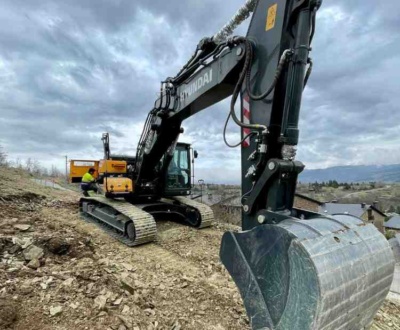Machines and Tools Used in Making Bitumen for Road Construction
- March 28, 2025
- Uncategorized
In road construction, one of the most essential materials used is damer (often referred to as bitumen or asphalt). This mixture of bitumen and aggregates is what gives roads their durable and smooth surface. The process of creating and applying bitumen involves several stages, each of which requires specialized machinery to ensure efficiency, quality, and longevity of the final product. At Baba Contractors and Engineers, we understand the significance of using the right equipment to produce high-quality damer for all kinds of road and highway construction. Below, we’ll explore the key machines and tools used in making and applying damer, and how they help deliver the reliable infrastructure that modern transportation depends on.
Asphalt Mixing Plant (Hot Mix Plant)
The journey of creating bitumen begins at the asphalt mixing plant, where the bitumen is combined with aggregates like gravel, sand, or crushed stone. This mixture is heated to high temperatures to ensure that the bitumen binds with the aggregates properly.
- Batch Mix Plant: This plant produces small, precise batches of asphalt, which are ideal for quality control. It’s widely used for both large and small-scale projects to ensure consistency in the final mix.
- Continuous Mix Plant: As the name suggests, this plant produces asphalt continuously, making it a more efficient option for larger projects with high production demands. It’s especially useful when there’s a need for consistent and uninterrupted asphalt production.
Both of these plants play a critical role in preparing the bitumen mixture, ensuring that the quality of the asphalt is high and consistent, whether it’s for a local road or a major highway.
Asphalt Pavers
Once the asphalt mixture is ready, it’s time to lay it on the road surface. This is where asphalt pavers come in. Pavers are machines used to evenly spread the hot asphalt mixture over the roadbed, creating a uniform, smooth surface.
- Tracked Pavers: These are designed for larger, more robust construction projects. With their tracks instead of wheels, tracked pavers distribute the weight evenly, making them perfect for rough terrains and large-scale projects.
- Wheeled Pavers: Used in smaller projects, these pavers are highly efficient on flat surfaces and offer greater maneuverability compared to tracked pavers. They are ideal for laying asphalt in urban areas or where space is limited.
The smoothness and consistency of the asphalt surface are essential for both road durability and vehicle safety, and pavers help achieve that with precision.
Road Rollers (Compactors)
Once the asphalt is laid, it needs to be compacted to ensure it is dense and smooth, which is where road rollers come into play. These machines apply pressure to the asphalt, ensuring it sticks together and forms a solid, durable surface.
- Vibratory Rollers: These are equipped with vibrating drums that help compact the asphalt quickly and efficiently. The vibrations ensure the material settles evenly and doesn’t have air pockets.
- Pneumatic Rollers: These have rubber tires and are ideal for providing a smooth finish on the road surface. They are particularly effective at giving the final road layer a polished, well-compacted appearance.
Compact rollers are essential in ensuring the road’s longevity and that it can withstand heavy traffic and weather conditions over time.
Bitumen Tankers and Distributors
Transporting bitumen to the construction site is another critical stage in road construction. Bitumen tankers are used to transport the hot bitumen from the refinery or production plant to the construction site.
- Bitumen Tankers: These specialized trucks are equipped with insulated tanks that keep the bitumen at high temperatures, preventing it from cooling and solidifying during transport.
- Bitumen Distributors: Used for spreading bitumen evenly on the road surface before the application of aggregates or asphalt. This ensures a perfect bond between the layers, allowing the road surface to remain stable and durable.
These vehicles ensure that bitumen remains at the ideal temperature and consistency for easy application.
Asphalt Milling Machines
In many cases, roads may need to be repaired or resurfaced. Asphalt milling machines, also known as cold planers, are used to grind up the old asphalt surface before new bitumen is applied. This process is known as asphalt milling and helps remove damaged or worn layers of pavement.
- Cold Planers: These machines are fitted with rotating drums that scrape the asphalt surface, removing old material and preparing the base for a new layer. They help maintain the road’s structure and ensure a clean base for the new asphalt.
Storage Silos for Hot Mix Asphalt
After the asphalt is mixed and ready, it needs to be stored properly until it’s time to lay it. Storage silos are used to hold the hot mix asphalt at the correct temperature until it’s ready for use. Some silos are equipped with heating systems to ensure that the asphalt stays hot, making the application smoother and more efficient.
Cold Mix Asphalt Equipment
For road repairs or in areas where hot mix asphalt isn’t feasible, cold mix asphalt is often used. Unlike hot mix asphalt, which is made and applied at high temperatures, cold mix asphalt is created at ambient temperatures. It is typically used for smaller repairs or maintenance projects.
- Cold Mix Plant: This plant is used to mix the bitumen with aggregates at normal temperatures, making it ideal for use in maintenance projects where heating the asphalt isn’t practical.
- Recycling Machines: These machines can be used to recycle old asphalt, mixing it with new cold mix asphalt to reduce costs and promote sustainability.
Crack Sealing Machines
Over time, cracks and small potholes may form in the asphalt surface. Crack sealing machines are used to fill in these cracks with hot bitumen sealants, preventing water from entering and damaging the underlying structure. This process is essential for prolonging the lifespan of the road.
At Baba Contractor and Engineer, we rely on the latest and most efficient machines and tools to ensure that our road construction projects are completed on time and to the highest standards of quality. Whether we’re building new roads, resurfacing old ones, or constructing complex infrastructure like bridges and highways, the right machinery is key to delivering long-lasting, durable results. By using state-of-the-art equipment, we ensure that every project we undertake is built with precision, efficiency, and reliability, contributing to safer and more efficient transportation networks for communities








